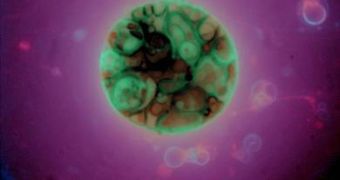Some scientists are playing God, and they're getting increasingly closer to actually succeeding in this game. Within 3 to 10 years, some research team could even create man-assisted "wet artificial life."
"We're talking about a technology that could change our world in pretty fundamental ways - in fact, in ways that are impossible to predict," said Mark Bedau, chief operating officer of ProtoLife of Venice, Italy, involved in a such research. "Creating protocells has the potential to shed new life on our place in the universe. This will remove one of the few fundamental mysteries about creation in the universe and our role." said Bedau.
Some scientist believe that cells of synthetic life could one day fight a wide array of issues, from diseases to absorbing greenhouse gases and destroying toxic waste.
3 major barriers must be surmounted in creating synthetic life: a membrane, keeping bad molecules out, allowing only beneficial good ones, and able to multiply; a genetic code controlling the cell's functions, from reproduction to environmental changes, but also able to mutate; and metabolism, feeding on chemicals from the environment to get energy.
Jack Szostak at Harvard Medical School, a leader in the field, forecasts 6 months for creating a cell membrane, based on fatty acids.
Szostak believes that once the membrane is ready, just by adding nucleotides, the building blocks of DNA, in the proper proportion, the Darwinian evolution will simply occur. "We aren't smart enough to design things, we just let evolution do the hard work and then we figure out what happened," Szostak said.
DNA is made of four nucleotide bases - adenine, cytosine, guanine and thymine (A,C,G,T). In Gainesville, Fla., Steve Benner, a biological chemist at the Foundation for Applied Molecular Evolution wants to create a synthetic genetic code made of 8 nucleotides.
"There are legitimate worries about creating life that could "run amok," but there are ways of addressing it, and it will be a very long time before that is a problem. When these things are created, they're going to be so weak, it'll be a huge achievement if you can keep them alive for an hour in the lab. But them getting out and taking over, never in our imagination could this happen.", Bedau said.

 14 DAY TRIAL //
14 DAY TRIAL //